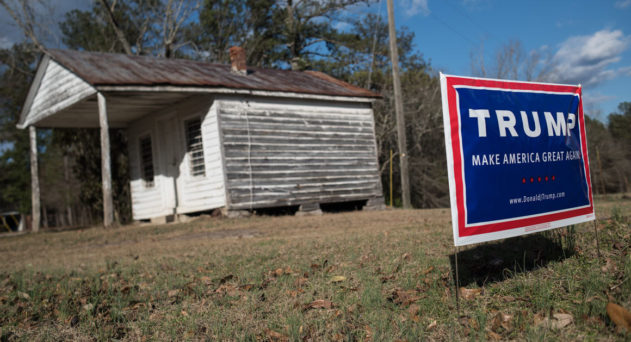We can’t expect a contingent that keeps outlets like InfoWars and Breitbart in business to thoughtfully evaluate new information unless they truly, genuinely want to learn.
Last fall while canvassing in Pennsylvania for Hillary Clinton, my family in Pittsburgh told me that I could call their house. “That’s not how it works,” I laughed. “No no,” my aunt went on. “We’re a Hillary house! You can put us down for three Hillarys!”
After reading stories from fellow Role Reboot writers Jessica Schreindl and Jennifer Gregory about familial Trump supporters, at least, I reasoned, I’ve never had this problem. There are no fights over politics at the dinner table. My family members text me well-wishes when I knock on doors or march in the streets. But there’s an insidious cloud, a palpable unease I feel as a blue voter returning to a red town. I am snubbed in a restaurant by an old friend who now supports Trump, because my social media defense of kneeling NFL players offended his MAGA-governed sense of patriotism. I am dismissed as “just another liberal academic” by a man with kids at one of the local high schools; told that he would never let me “indoctrinate his kids” at the community college.
As the furious journalistic obsession with checking in on rural Trump voters rages on a year post-election, I don’t need to keep up. All I have to do is visit home.
*****
In Washington County, Maryland, citizens cast their ballots nearly two to one for Trump over Clinton. The Guardian interviewed an antique shop owner in Hagerstown last winter, who, when confronted with Trump’s admitted penchant for fondling women, asked, “What man never grabbed a woman’s pussy?” And the local Herald Mail has run a series of articles on Trump’s base, most recently “Tri-State Trump supporters say they would vote the same today.”
This doesn’t surprise me. Trump paraphernalia still litters the yards of my old Washington County neighbors over a year after the election. While walking the dog over Thanksgiving, I passed by a house with not one but two Make American Great Again signs stuck into the grass, a matching flag, even a few stickers adorning the family vehicles. “Hey there!” the owner greeted me. “Cute dog!” How do I read this kindness, given the context?
The blend of bigotry and hospitality is exactly what confounds me about returning to my hometown. I had virtually no problems growing up here. In fact, it was a nice place to spend my childhood. But now that the data points to racism (not “economic anxiety”), as the chief catalyst to Trump’s election, and as that continued support is on display in my old neighborhood, I’ve realized that a lot of folks were only nice to me because I looked like them, spoke English like them, and went to church like them. In other words, I passed.
Growing up in a rural, conservative area is all about passing. It’s about learning to walk the walk and talk the talk so that you won’t be bullied or ostracized. My best friend pretended to like girls in school so that no one would harass him for being gay. While working at an evangelical Christian school, I hid the fact that I was a feminist Democrat who went to Unitarian Universalist services. But some of us had an easier time passing than others. In college, a close friend was not allowed to bring his black roommate to our Thanksgiving dinner because it would upset his racist grandfather. Another friend’s mother and grandmother were recently accosted by a man at the mall simply for speaking to each other in Spanish. When you represent another race or country, there is no hiding who you are. The hate arrives in pejoratives while you’re shopping or, in the case of a black former student of mine, as a KKK flyer on your welcome mat advertising the next local rally.
*****
Cultural cognition theory argues that people generally judge the validity or threat of certain issues in accordance with their group identities: for example, someone raised with a Young Earth creationist point of view would likely disregard evidence suggesting that our planet is much older. “[Trump] is a kind of conservative the way I am and I like that,” one Washington County resident told The Herald Mail in the fall of 2017. Another resident in neighboring Martinsburg, West Virginia liked that Trump “was pissed at the same thing I was.” Pair this extreme confirmation bias with a lack of information flow, as rural areas have less exposure to education and diversity than urban ones, and it comes as no surprise that Trump supporters respond to conflicting reports by digging their heels in. We can’t expect a contingent that keeps outlets like InfoWars and Breitbart in business to thoughtfully evaluate new information unless they truly, genuinely want to learn.
I don’t want to hear any more from Trump supporters, because I’ve heard enough of the same song on repeat. I want media outlets like The New York Times to take the time they would have spent checking in six months, a year, two years later and devote it to those of us cleaning up the mess. I want to hear from scientists who are fighting every day to tackle global challenges despite the shameful reduction in funding. I want to hear from DREAMers who work hard and contribute to our society about the fear and uncertainty they battle every day under this administration. The average unwavering Trump voter pines for a time that will never be, and really never was. It’s our time now.
Chelsea Cristene is a communications associate and English professor based in Washington, DC. She has been published by the Good Men Project, Salon, xoJane, and MamaMia, and runs a film review blog, Catch Up, with fellow Role Reboot contributor Telaina Eriksen. Find her on Twitter.
Other Links:

